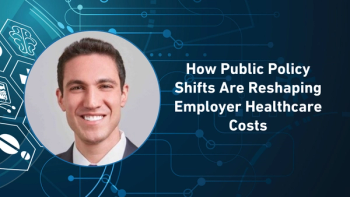
Rising Costs, Shrinking Margins
In the second part of his Pharma Commerce video interview, Marschall Runge, MD, PhD, dean of the University of Michigan Medical School and author of The Great Healthcare Disruption, outlines how the federal cap on Medicaid provider taxes could affect access to care for Medicaid patients.
In a video interview with Pharma Commerce, Marschall Runge, MD, PhD, dean of the University of Michigan Medical School and author of The Great Healthcare Disruption, addresses the potential impacts of a federal cap on Medicaid provider taxes and how such a policy could affect hospital systems. particularly in states like Michigan that have uniquely implemented Medicaid expansion.
Runge emphasized that hospitals already operate on extremely thin margins when it comes to Medicare and Medicaid reimbursement. Any policy that restricts revenue opportunities from these programs threatens their financial sustainability. He noted that, contrary to popular belief, hospitals often struggle just to break even under current public payer rates, and additional funding through provider taxes has historically helped improve access to care.
His primary concern centers on patient access. Runge pointed out that healthcare access is already limited due to workforce shortages—especially in primary care—and that wait times are growing. Reducing hospital revenue by capping provider taxes could exacerbate these issues, particularly in underserved areas.
He warned that a federal cap would create new challenges, not only financially but operationally, by potentially limiting patient access across the entire care continuum, from primary to specialty services. He stressed that focusing solely on budgetary savings without considering the downstream impact on health outcomes and system strain is shortsighted. In his view, the proposed cap would have minimal benefit to the federal budget but could lead to long-term harm to patient care and public health infrastructure.
Runge urged policymakers to think beyond dollars and cents and consider how such decisions affect real-world health outcomes, workforce strain, and already fragile access points within the healthcare system.
He also comments on how this proposal might affect access to care for Medicaid patients, particularly in expansion states; alternatives or modifications he would propose to ensure both fiscal responsibility and the sustainability of hospital funding; the role academic medical centers should play in shaping Medicaid policy moving forward; and much more.
A transcript of his conversation with PC can be found below.
PC: How might this proposal affect access to care for Medicaid patients, particularly in expansion states?
Runge: The expansion states, in my view, did the right thing, and what they did was try to be able to afford to add physicians in different areas, add services, and again, coming back to creating access. We all have to look at our budgets, and we have a very tight budget in Michigan Medicine, in terms of our proposed budget, which starts July 1. We're looking at a 1.7% margin for the coming year. In most businesses, that would be very difficult to accept. We're not a for-profit, but in a for-profit company, there's no way that would be acceptable.
For us, what it risks is that it's hard to predict everything that may happen in the coming year, and so there may be factors that very negatively influence our budget for different reasons. If you look at it just in the big picture, costs are going up in healthcare. Labor costs are going up, material costs are going up, pharmaceutical costs are going up, and those are all an absolutely critical part of delivering great healthcare. It’s a continuation of what has been going on for the last 10 years, which is as costs increase, reimbursement decreases. We do everything we can to make it more efficient, but there comes a point that we can't afford to pay the people that we would need to continue to provide enhanced access.
Newsletter
Stay ahead in the life sciences industry with Pharmaceutical Commerce, the latest news, trends, and strategies in drug distribution, commercialization, and market access.




